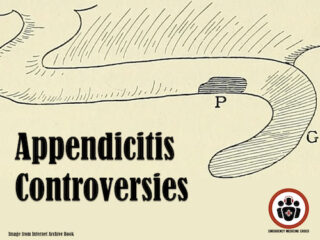
Episode 48 – Pediatric Fever Without A Source
Have you ever seen a child in your emergency department with a fever - he asks sarcastically? At the ginormous community hospital where I work, we see about 25,000 kids each year in our ED and about half of them present with fever. Yes, there still exists fever phobia in our society, which brings hoards of worried parents into the ED with their febrile kids. For most of these kids it's relatively straight forward: Most kids with fever have clinical evidence of an identifiable source of infection – a viral respiratory infection, acute otitis media, gastro, or a viral exanthem. However, about 20% have Fever Without a Source despite your thorough history and physical exam. A small but significant number of this 20% without an identifiable source of fever will have an occult bacterial infection - UTI, bacteremia, pneumonia, or even the dreaded early bacterial meningitis. These are all defined as Serious Bacterial Infections (SBI), with occult UTI being the most common SBI especially in children under the age of 2 years. In the old days we used to do a full septic work-up including LP for all infants under the age of 3 months, but thankfully, times have changed in the post-Hib and pneumoccocal vaccine age, and we aren’t quite so aggressive any more with our work-ups. Nonetheless, it's still controversial as to which kids need a full septic workup, which kids need a partial septic workup, which kids need just a urine dip and which kids need little except to reassure the parents. In this episode, with the help of Dr. Sarah Reid and Dr. Gina Neto from the Children's Hospital of Eastern Ontario, we will elucidate how to deal with fever phobia, when a rectal temp is necessary, how to pick out the kids with fever that we need to worry about, how to work up kids with fever depending on their age, risk factors and clinical picture, who needs a urinalysis, who needs a CXR, who needs blood cultures and who needs an LP, and much more....
Episode 47: Evidence Based Medicine from NYGH EMU Conference 2014
Dr. Walter Himmel (the 'walking encyclopedia of EM') gave a fantastic talk from North York General's Emergency Medicine Update Conference in Toronto, which have edited into a podcast with key commentary and summaries. Dr. Himmel eloquently shows us, through absolutely stunning personal cases, how evidence based medicine can be appropriately or inappropriately applied in real practice, resulting in major outcome differences for your patients. He elucidates the importance of clinical experience, patient values and ED resources in helping apply the medical literature to your practice. He reviews the essence of critical appraisal, the hierarchy of evidence and how to keep up with the emergency medicine literature. The famous NINDS thrombolysis for stroke trial is distilled down to a few key considerations and the NEJM transfusion for upper GI bleed trial from last year is dissected, analyzed and then applied to Dr. Himmel's personal cases, to help us understand exactly how to apply the literature to our daily practice. Blog post and written summary prepared by Keerat Grewal, edited by Anton Helman July 2014
Episode 46 – Social Media and Emergency Medicine Learning
In early June of this year I caught up with Dr. Rob Rogers of iTeach EM and The Teaching Course, Dr. Ken Milne of The Skeptics Guide to EM and Dr. Brent Thoma of Academic Life in EM and Boring EM at the Canadian Association of Emergency Medicine Conference in Ottawa to chat about the evolution of Social Media & Emergency Medicine Learning. In this podcast, we discuss how Social Media can enhance your career, tips on how to get the most out of FOAMed without getting overwhelmed by the volume of material, swarm-based medicine, tacit knowledge sharing, the flipped classroom, the use of FOAMed in emergency medicine training curricula, how Twitter, Google+, Google Hangout and Google Glass have changed the face of medical education, and much more.
Episode 45: NYGH EM Update Conference 2014
This past May in Toronto, the largest and, in my opinion, best Canadian EM conference, North York General Hospital's Emergency Medicine Update Conference, attracted 'Captain Cortex' himself, Stuart Swadron, a Toronto native to talk about his approach to vertigo, which highlights how not to miss a posterior circulation stroke. For the seventh year running the EMU conference was proud to have one of the worlds most well known EM educators, Amal Mattu who presented the most important Cardiology Literature from the past year. This podcast includes edited versions of their talks with commentary and summaries.
Episode 44 – Whistler Update in Emergency Medicine Conference 2014
In this episode on Whistler's Update in Emergency Medicine Conference 2014 Highlights we have... Chapter 1 with David Carr on his approach to Shock, including the RUSH protocol, followed by a discussion on Thrombolysis for Submassive Pulmonary Embolism.... Then in Chapter 2 Lisa Thurgur presents a series of Toxicology Cases packed with pearls, pitfalls and surprises and reviews the use of Lipid Emulsion Therapy in toxicology....Finally in Chapter 3 Joel Yaphe reviews the most important articles from 2013 including the Targeted Temperature Managment post-arrest paper, the use of Tranexamic Acid for epistaxis, return to play concussion guidelines and clinical decision rules for subarachnoid hemorrhage. Another Whistler's Update in Emergency Medicine Conference to remember.......
Episode 43 – Appendicitis Controversies
In this episode on Appendicitis Controversies, we have the continuation of our discussion on abdominal pain emergencies with Dr. Brian Steinhart & Dr. David Dushenski. We kick off the discussion with key clinical pearls and pitfalls in the history and physical exam with their respective liklihood ratios when assessing patients with abdominal pain for appendicitis - a diagnosis that is still sometimes missed despite its prevalence. Dr. Dushenski hacks apart the Alvarado and Appendicitis Inflammatory Response Scores and we discuss the value of WBC, CRP and urinalysis in the work-up of appendicitis. Next up are the controversies of imaging algorithms using ultrasound and CT abdomen, as well as the factors affecting which imaging algorithm you might pursue. We wrap up the discussion on Appendicitis Controversies with a critical look at the value of antibiotics in the ED for appendicitis and which patients might be appropriate for non-surgical management.







